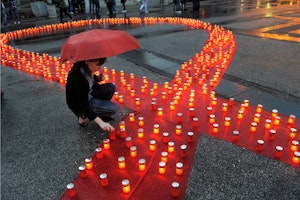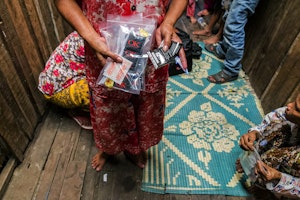Death, Drug Treatment, and Christ’s Love
By Daniel Wolfe
A tragedy struck the “Christ is Love” drug treatment center in Peru last week, when residents trapped behind the facility’s locked doors were burned alive. As Rebecca Schleifer of Human Rights Watch points out in her excellent Huffington Post piece on the tragedy, those seeking addiction treatment at this facility instead received religious exhortations, physical abuse, isolation, and in the end, death.
The story is unfortunately one of many tragic accounts from so-called drug treatment centers offering harsh discipline, bodily privations, and lectures about moral weakness to those who actually need medication and counseling to ease their discomfort. Death by burning is also strikingly common—in Russia, for example, 43 young, mostly HIV-positive women (and two nurses) died in 2006 when staff ran away from a substance abuse hospital during a fire, leaving the patients to struggle against barred windows and locked doors. Several years later, another fire and more deaths occurred in a closed drug treatment facility in Kazakhstan. The logic of “treatment” facilities that require their patients to be locked in against their will goes unquestioned in these incidents, which are dismissed as individual tragedies. One hopes that the Peru fire will be the last, and more generally that national authorities in that country and in others will take steps to scrutinize laws and practices that justify locking drug users up and abusing them in the name of making them better.
We at the International Harm Reduction Development Program recently published Treated with Cruelty, which includes multiple personal accounts of abuses in the name of drug treatment and rehabilitation, and an analysis of the human rights implications. From Mexico to China, Russia to Cambodia, the stories—of flogging therapy, starvation, chains, and slave labor—offer different windows onto the same terrible theme: that “tough love” is enough to cure drug addiction, and that civilian casualties and years of confinement are regarded as an unfortunate but necessary part of the battle. This volume was part of the Campaign to Stop Torture in Health Care, named to draw attention to the fact that intentional infliction of cruel, inhuman, and degrading treatment and suffering are more common than we would like to believe in the health care field, and that these practices are illegal, abhorrent, and can be stopped.
Even the fire at Christ is Love will no doubt seem fitting to some who believe that the wages of sin are death. Those with such beliefs, however—and indeed, all those supporting drug treatment facilities that rely on beating, starving, humiliation, and barred doors—have no place in the world’s approach to drug treatment. One look at the horrible pictures at Christ is Love reminds us that the current standards are too low, and that it is the system, rather than those who are drug dependent and seeking help, that need to be the priority for change.

Until December 2021, Daniel Wolfe was director of the International Harm Reduction Development Program at the Open Society Foundations.

